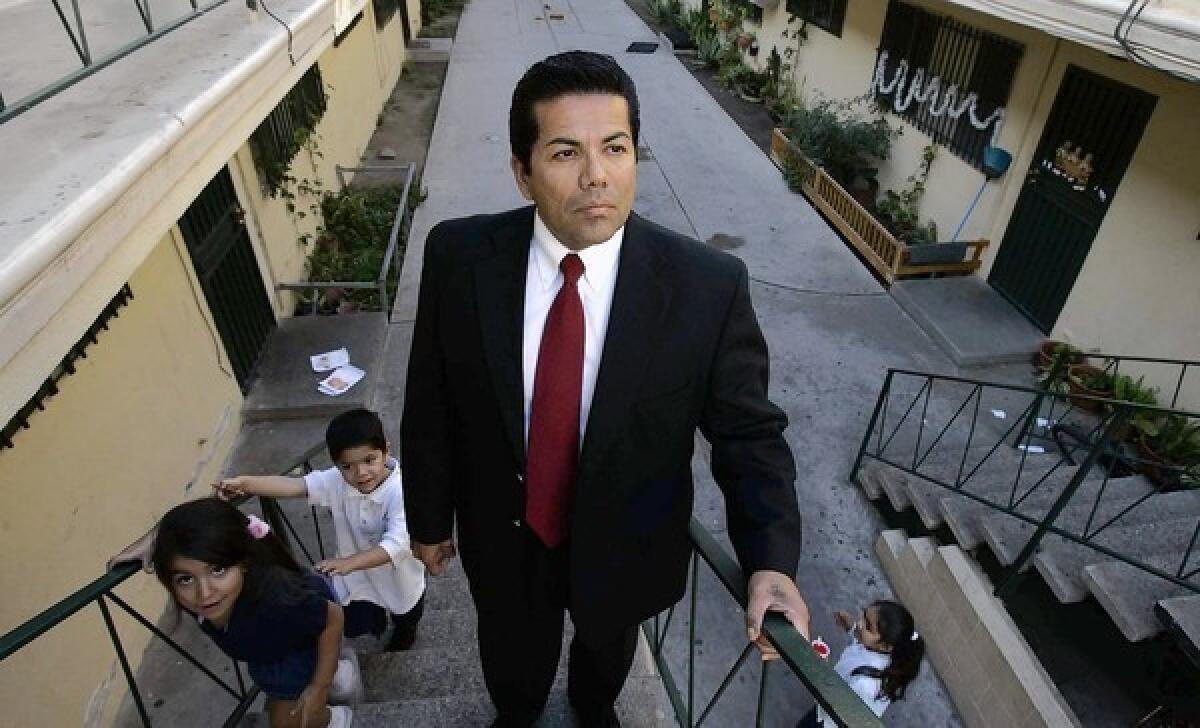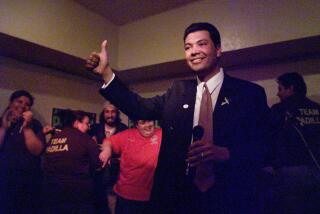The rise and fall of ‘Mr. Cudahy’

George Perez started at the bottom of Cudahy city government, cleaning toilets as a $6.50-an-hour a janitor.
He was ambitious, though, and in eight years was elected to the City Council. Six years later, with no college education or management training, Perez was running the southeast L.A. County town as city manager.
He became the embodiment of power in the working-class immigrant city along the 710 Freeway. His up-from-the-bootstraps story made him a hero to some — a kind of “Mr. Cudahy,” with a tattoo of the city seal on his right leg to prove it. He served as emcee at town hall meetings, where door prizes such as blenders, fans and heaters were raffled off. When people came to City Hall to complain, Perez sometimes met them personally.
But now, Cudahy is mired in scandal, and Perez appears to be in the center of it. Three city officials have pleaded guilty to what federal prosecutors described as deeply rooted corruption. Perez has not been charged, but court documents repeatedly refer to a top city official identified as “G.P.” orchestrating much of the alleged wrongdoing. Two law enforcement sources said “G.P.” is George Perez.
Federal documents paint Cudahy as a place where bribes became routine, elections were fixed on Perez’s orders, city workers acted as gun-packing bodyguards, and the city manager sent underlings to bring illegally obtained pain pills back to City Hall. They describe Perez being chauffeured to a Denny’s restaurant to pick up bribes.
Many residents said the allegations did not surprise them. They said that despite his populist persona, rumors of corruption long flowed from Cudahy City Hall, where nothing seemed to happen without Perez’s blessing.
“Everything had to go through him,” said Martin Fuentes, 37, a longtime Cudahy resident who knows Perez. “You had to talk to George first if you wanted to get anything done.”
Perez declined to comment for this article, but in the past he strongly denied any wrongdoing. In a brief conversation outside his Hacienda Heights home, his wife, Tania, said he loved the city and said he did nothing illegal.
Perez grew up in a Cudahy as it and other cities in southeast L.A. County were struggling. After World War II, factories such as General Motors, Chrysler and Bethlehem Steel formed the region’s industrial core, providing jobs. Cudahy had been sparsely populated until the 1960s, when developers began building apartments on unusually deep lots.
Cudahy became the state’s second-densest city, behind only Maywood, with 25,000 residents squeezed into 1.2 square miles. About 95% of the city is Latino, many of them immigrants just scraping by.
Rise to power
In 1986, Perez, then 26, got a part-time job as a city janitor. Several years later, he became a senior parks and recreation leader making $8 an hour. In 1994, he was elected to the City Council.
By 2000, Perez, married and with four children, was serving on the City Council and working at a building materials store. Then he lost his job. The council changed city laws so it could appoint Perez city manager. A group of Southern California city managers were so disturbed by Perez’s elevation that they asked for a criminal investigation. County prosecutors launched a conflict-of-interest probe, but investigators were met with silence at Cudahy City Hall, they said. In a memo produced by the prosecutors, they wrote that it was “clear that Perez liked politics and power more than the building materials business.”
Perez quickly emerged as Cudahy’s power broker, handpicking the City Council, longtime city official Angel Perales told an FBI informant wearing a wire late last year.
“George brought them in,” said Perales, who has pleaded guilty to bribery and extortion. “And you know why? Because he could manipulate them.... They were his puppets.”
By then, Perez had traded in his glasses, baseball caps and shirts with a pocket protector and was wearing finely tailored suits and sporting a dome of well-coiffed hair.
If an outside candidate wanted an endorsement from a Cudahy council member, he had to go through Perez, said Mario Beltran, a campaign consultant and ex-Bell Gardens councilman. “By far he was more politically involved and influential than most city managers I know,” Beltran said.
Winning elected office in Cudahy without Perez’s support was considered impossible. In late 2008, when Perez did not want incumbent Rosa Diaz to run in the following spring’s election, he offered her a job at City Hall, according to a phone recording between the two obtained by The Times. After she told Cudahy’s city attorney, David Olivas, about Perez’s proposal, the city manager became upset.
“When you and I spoke, and I offered you a position here, that was between you and me and no one else,” Perez told Diaz. “And you started talking to David, and something like that could more or less be illegal.”
He also expressed frustration that she wanted the job offer in writing. “I’m not going to jail,” he said on the tape.
Diaz didn’t take the job and ran to keep her council seat without Perez’s support. She lost in a landslide.
Olivas confirmed that Diaz called him about Perez’s offer to appoint her treasurer. He said he told her a new state law required she wait a year before she could work for the city. Olivas said he couldn’t talk about his conversations with Perez because of attorney/client privilege. Stanley Friedman, Perez’s attorney, said his client told him there wasn’t a quid pro quo with Diaz and that they had talked only about what jobs might be available for her at the city.
Crime in Cudahy
During Perez’s tenure, Cudahy struggled with a reputation for gangs, drugs and crime. Despite that, Perez and other council members seemed unwilling to crack down on problems at a local nightclub, according to Frank Hauptmann, the former police chief of Maywood, which patrolled Cudahy. Shootings spilled out of El Potrero nightclub, and police chases that started at the club spread into other cities.
At one point, South Gate sued Cudahy over plans to expand operations at El Potrero.
The club was a hangout for some Cudahy officials, including Councilman Osvaldo Conde, one of those who has pleaded guilty to corruption.
At Christmastime, council members would ride through town on tow trucks, tossing candy to children in processions that would often end with toy give-aways at El Potrero — which would sometimes host events such as G-string contests at night.
There wasn’t a political will to strongly regulate the club, Hauptmann said.
“I wanted stronger enforcement there, and he was trying to say they were the bread and butter of the community,” Hauptmann said of Perez. But “no city would want a place like that in the community, even if they brought money.”
Hauptmann said he wasn’t surprised that court records showed some of the surreptitiously taped conversations that got Conde, Perales and Mayor David Silva in trouble took place in the nightclub. Silva also pleaded guilty.
Some of the more serious allegations in the federal court records involve voter fraud. For years, elections in Cudahy went uncontested. That changed in 2007 and 2009. The elections were marked by viciousness, with cars and homes vandalized, threatening phone calls and a Molotov attack at the home of a political challenger.
After his arrest, Perales told investigators that Perez asked him and others to enlist nonresidents to register to vote in Cudahy, according to court records. Perales also alleged that he and Perez opened absentee ballots sent to City Hall and dumped those not marked for Perez’s favored candidates.
Toward the end of his run at the top of Cudahy’s government, Perez was allegedly getting high at City Hall on pain pills that he shared with others, according to federal documents.
Friedman said Perez “adamantly denies any wrongdoing, whether it’s fiscal wrongdoing or being involved with any voter fraud or any illegal drug activity at City Hall.”
Last year, Perez’s reign as Cudahy’s city manager abruptly ended after the City Council fired him with no explanation, a stunning reversal for the man who had been boss of Cudahy for more than a decade. Then this June, just weeks before the FBI raid, county prosecutors launched an investigation after The Times reported that Perez may have illegally given himself cost-of-living raises meant for rank-and-file employees.
The turmoil at City Hall has some longtime Cudahy residents shaking their heads. “George is a guy who loved his city. He grew up there,” Fuentes said. “He’s a good guy that unfortunately has done things that were not so nice.”
More to Read
Sign up for Essential California
The most important California stories and recommendations in your inbox every morning.
You may occasionally receive promotional content from the Los Angeles Times.













